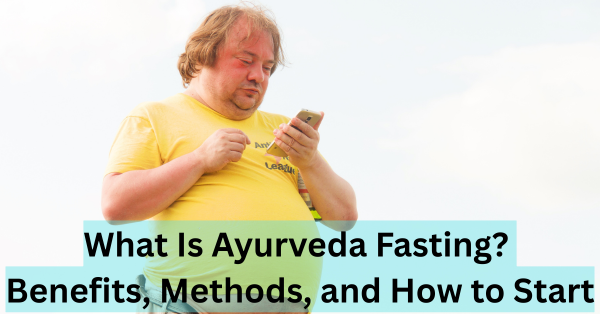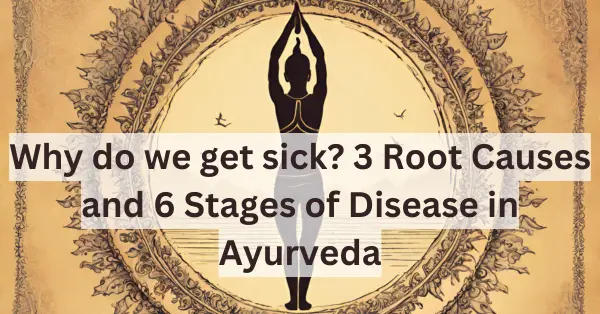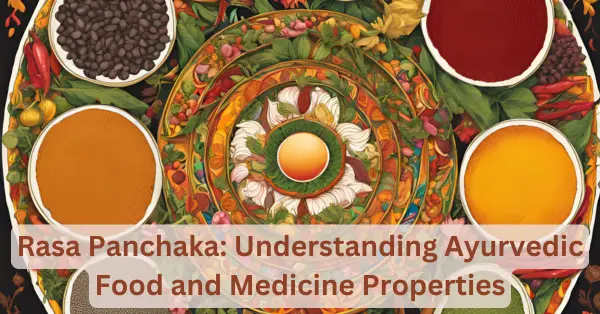People often complain about heaviness, lethargy, and being uncomfortable after a meal. This is due to improper digestion of food. In this blog, we will learn everything about Ayurveda fasting or Upvasa.
Why do Ayurveda Fasting?
- Regains lost digestive strength
- Helps remove mental fog
- Balances all three doshas
- Improves metabolism and manages weight
- You have signs like a coated tongue, are always lethargic, have no appetite, feel bloated and heavy, have bad breath, bad body odour, and chronic fatigue.
- By reducing inflammatory markers and promoting immune cell regeneration. Fasting stimulates autophagy, which promotes cell renewal and slows down the ageing process.[1]
Types of fasting in Ayurveda
1. Avoid over-eating
2. Fruit or fruit juice only fast
3. Vegetable soup fast
4. Cut some particular foods from the diet for a day
5. Water only fast
Why fasting is important
Fasting helps to eliminate or halt the production of Ama or acidity.
Ama or acidity is the cause of all diseases. Overeating or poor-quality foods leads to Ama or acidity.
In Ayurveda, Ama is the cause of all diseases. When Ama accumulates in the body, we feel fatigue, anxiety, bad breath, coating on the tongue, and sluggishness.
If we continue this, more Ama accumulates, and then Ama or acid starts circulating in the bloodstream. This toxic, undigested food starts circulating throughout the body.
This sticky Ama starts settling in our weak spots, eventually manifesting in the most serious conditions and diseases.
Hence, it’s necessary to eliminate or halt the production of Ama. Ayurveda recommends fasting one day every fortnight to cleanse the intestines.
How does Ayurveda Fasting Work
Fasting ignites the digestive fire, which, without food, digests vitiated doshas and restores health.
Yoga Shastra views fasting on three levels—physical food, impressions, and associations—to unite the astral, physical, and causal bodies. Ayurveda recommends fasting based on an individual’s dosha, agni, age, season, and strength, using it for both prevention and therapy.[2]
How to do an Ayurvedic fast
Eliminate processed sugar, gluten, processed foods, leftover food, fast food, caffeine, and alcohol.
If you are tired and dull in the morning after waking up, this is the best time for fasting.
You should consider prevalent health conditions, your Prakriti, and digestive fire before fasting.
You can do fast once a week, once a fortnight, or once a month.
Eat only simple, easily digestible food items.
Ayurveda Fasting as per Dosha
In Ayurveda, you should fast according to your body’s prakriti. Let’s understand Ayurveda fasting according to the dosha.
Vata Dosha
- Fasting aggregates the Vata Dosha.
- Fasting is not recommended for Vata people unless they are heavy.
- Water-only fasting is not recommended at all.
- They can consider khichdi only for fasting. Also known as mono fasting or fasting with one type of food only.
Pitta Dosha
- Bitter and astringent vegetable juices fast is advised. Leafy vegetable juice.
- Water-only fast is not recommended.
- One time, a Khichdi fast can be done. You can also have Pitta Tea.
Kapha Dosha
- Kapha people can fast once or twice a week if they are healthy.
- Trikatu Powder can be added to the food.
- Water-only fast is recommended.
You are not what you eat, you are what you digest — Ayurveda Saying
Best Foods for Ayurveda Fasting
- Khichadi. Great for balancing the three Doshas.
- Stewed Pears or Apples. Easy to Digest
- Any Organic Tea. Detoxes the body.
- Vegetable Soup or Boiled Vegetables. Nutritious and easy to digest.
- Kanji or Rice Water. Cooling and refreshing.
- Fresh Fruits. Light and Nutritious
- Soaked Dry Fruits. Good energy with a cooling effect.
Bonus Tips for Ayurveda Fasting
- Eat solid food if you feel tired.
- Eat when you are hungry.
- Have Tridoshic Tea.
- Triphala powder is good while fasting
- Practice meditation and pranayama
- Slowly end the fast. Don’t jump back into a regular diet. Have light food for one day; otherwise, you may stress your digestive fire, causing more harm than good.
Who Should Not Do Ayurveda Fasting?
- Pregnant or Breastfeeding mothers
- Under-nourished or underweight people
- People with weakened immunity
- During Periods or menstruation
- Vata Prakriti People in general
Conclusion
Fasting can be a healing process rather than just a detoxing process. Fasting is the best medicine for indigestion and all the diseases associated with indigestion.
Eating within a 6-hour window and fasting for 18 hours can shift metabolism from glucose to ketone use, increasing stress resistance, longevity, and reducing disease risk. Repeated exposure to fasting triggers lasting adaptive responses: cells boost antioxidant defences, DNA repair, protein quality control, mitochondrial biogenesis, and autophagy, while reducing inflammation.[3]
Reference
[1] Biswas T, Singh V, Chowdhury K. Exploring therapeutic potential of fasting (Upvasa)– A comprehensive review. IJAM [Internet]. 2024 Dec. 15 [cited 2025 Jul. 6];15(S1):122-6. Available from: Link to Study. <Go to Citation>
[2] H Shripathi Adiga, Ramya Adiga. Concepts and canons of fasting in Ayurveda. Journal of Fasting and Health [Internet]. 2013 Mar [cited 2025 Jul 6];1(1):37–40. Available from: Link to Study. <Go to Citation>
[3] Bhupendra Kumar B, Priyangika RKN, Sharma A, Kadu AS, Sharma A. Health Benefits of Fasting {UPAVASA}: Review of Ayurveda and Modern Science Perspectives. Int J Multidiscip Res. 2025;7(1):1–10. Available from: Link to Study. <Go to Citation>





